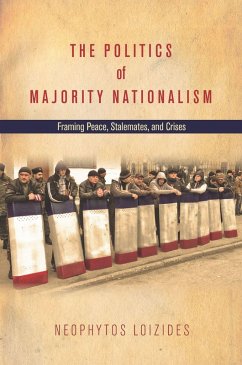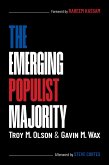- Gebundenes Buch
- Merkliste
- Auf die Merkliste
- Bewerten Bewerten
- Teilen
- Produkt teilen
- Produkterinnerung
- Produkterinnerung
Neophytos Loizides is a Reader in International Conflict Analysis at the University of Kent and a Leverhulme Research Fellow.
Andere Kunden interessierten sich auch für
![Marx, Lenin, and the Revolutionary Experience Marx, Lenin, and the Revolutionary Experience]() Paul LeBlancMarx, Lenin, and the Revolutionary Experience62,99 €
Paul LeBlancMarx, Lenin, and the Revolutionary Experience62,99 €![Majority Minority Majority Minority]() Justin GestMajority Minority39,99 €
Justin GestMajority Minority39,99 €![The Silenced Majority The Silenced Majority]() Reed PryorThe Silenced Majority34,99 €
Reed PryorThe Silenced Majority34,99 €![The Emerging Populist Majority The Emerging Populist Majority]() Troy M OlsonThe Emerging Populist Majority23,99 €
Troy M OlsonThe Emerging Populist Majority23,99 €![Answer Of The Hon. Honoré Mercier To The Pamphlet Of The Equal Rights Association Against The Majority Of The Inhabitants Of The Province Of Quebec Answer Of The Hon. Honoré Mercier To The Pamphlet Of The Equal Rights Association Against The Majority Of The Inhabitants Of The Province Of Quebec]() Honoré MercierAnswer Of The Hon. Honoré Mercier To The Pamphlet Of The Equal Rights Association Against The Majority Of The Inhabitants Of The Province Of Quebec28,99 €
Honoré MercierAnswer Of The Hon. Honoré Mercier To The Pamphlet Of The Equal Rights Association Against The Majority Of The Inhabitants Of The Province Of Quebec28,99 €![Majority Rule in Combination With Representative Government in City, State and Nation Can Be Attained in a Non-Partisan Way and With Little Effort Majority Rule in Combination With Representative Government in City, State and Nation Can Be Attained in a Non-Partisan Way and With Little Effort]() George Henry ShibleyMajority Rule in Combination With Representative Government in City, State and Nation Can Be Attained in a Non-Partisan Way and With Little Effort31,99 €
George Henry ShibleyMajority Rule in Combination With Representative Government in City, State and Nation Can Be Attained in a Non-Partisan Way and With Little Effort31,99 €![Majority Decisions Majority Decisions]() Majority Decisions140,99 €
Majority Decisions140,99 €-
-
-
Neophytos Loizides is a Reader in International Conflict Analysis at the University of Kent and a Leverhulme Research Fellow.
Hinweis: Dieser Artikel kann nur an eine deutsche Lieferadresse ausgeliefert werden.
Hinweis: Dieser Artikel kann nur an eine deutsche Lieferadresse ausgeliefert werden.
Produktdetails
- Produktdetails
- Verlag: Stanford University Press
- Seitenzahl: 272
- Erscheinungstermin: 30. September 2015
- Englisch
- Abmessung: 236mm x 156mm x 22mm
- Gewicht: 499g
- ISBN-13: 9780804794084
- ISBN-10: 0804794081
- Artikelnr.: 42792589
- Herstellerkennzeichnung
- Libri GmbH
- Europaallee 1
- 36244 Bad Hersfeld
- gpsr@libri.de
- Verlag: Stanford University Press
- Seitenzahl: 272
- Erscheinungstermin: 30. September 2015
- Englisch
- Abmessung: 236mm x 156mm x 22mm
- Gewicht: 499g
- ISBN-13: 9780804794084
- ISBN-10: 0804794081
- Artikelnr.: 42792589
- Herstellerkennzeichnung
- Libri GmbH
- Europaallee 1
- 36244 Bad Hersfeld
- gpsr@libri.de
Neophytos Loizides is a Reader in International Conflict Analysis at the University of Kent and a Leverhulme Research Fellow.
Contents and Abstracts
1Politics of Majority Nationalism: Regional and Global Perspectives
chapter abstract
Chapter 1 situates Greek and Turkish nationalism within the broader picture
of conflict-ridden national majorities. It provides key definitions and
typologies; it integrates theories of nationalism, social movements and
ethnic conflict, aiming to demonstrate major gaps in these literatures. It
argues that majority nationalism and the variations in the response of
majorities cannot be adequately explained simply by history or
long-standing ethnic and religious rivalries. Moreover, theories of ethnic
mobilization, which focus on single factor explanations, such as group
status, relative (or actual or unexpected) deprivation, fear, and
repression, offer an inadequate explanation of the politics of majority
nationalism. Following McAdam, Tilly, and Tarrow (1997:152), this chapter
argues for an integrated perspective in the study of majority nationalism,
noting the conditions and constraints that shape protest, the institutions
and mobilizing structures that support it, and the framing processes around
which action is perceived and acted out.
2Frames of Peace, Stalemates and Crises
chapter abstract
This chapter focuses on the study of pre-crisis framing (i.e. framing
before the advent of a crisis or mediation). It asks how framing processes
are contributing to subsequent crises, stalemates or peace processes. It
addresses in more detail the following issues: the conceptualization of
frames in general and their pre-crisis features in particular; the key
differences between framing and the broader conceptual category of
perception; the debate on the limits of plasticity of frames, or to what
extent frames should correspond to pre-existing "perceived realities"; the
two necessary component frames relating motives and opportunities; the
detailed coding procedures of adversarial and non-adversarial frames.
Drawing on the post-Ottoman successor states as a case study, the chapter
also argues that the framing of false analogies with the past explains why
societies in the region have generally failed in accommodating diversity
through federalism and power-sharing.
3Trapped in Nationalism? Symbolic Politics in Greece and the Macedonian
Question
chapter abstract
Chapter 3 examines how adversarial framing on the Macedonian issue
constrained a moderate government in Greece from capitalizing on its peace
potential in the early 1990s when major demonstrations in Thessaloniki and
Athens attracted at least a million people each. At the same time, it asks
why conflicts related to Turkey or Albania received little attention
despite ethnic antagonisms and an alleged "civilizational divide" between
Greece and its predominantly Muslim neighbors. Drawing evidence from the
Hellenic Parliament, this chapter demonstrates that on Turkish and Albanian
issues, a sizeable moderate camp championed reconciliation and compromise,
maintaining a balance between hardliners and moderates in Greece. Even so,
hardliners monopolized the framing of Greece's Macedonian policies, thus
shaping an early nationalist consensus. By adopting this hegemonic frame,
mainstream Greek political elites prevented adaptation to new realities in
the 1990s, obstructing a feasible peace agreement between the two nations.
4Europe and (non) Accommodation in Turkey: Framing the Kurds, Greece and
Syria
chapter abstract
Chapter 4 focuses on Turkey and the Kurdish question particularly in
relation to the country's neighbors. It highlights the 1998 Öcalan incident
when hundreds of thousands of Turkish citizens joined mass nationalist
mobilizations to protest against third countries (Syria, Italy and Greece)
(allegedly) supporting the PKK (Kurdistan's Workers Party). It examines how
Turkish elites framed foreign governments and the PKK as the parties solely
responsible for the Kurdish uprising, making any potential compromise
unimaginable for the next two decades. At the same time the chapter
examines the progress made by Turkey in reaching better relations with
Greece leading to the Helsinki compromise in 1999. The chapter looks at
parliamentary records and political discourse in the years preceding this
crucial 1998-9 period to identify the framing of Turkey's foreign policy,
explain variation in foreign policy outcomes and Turkey's subsequent
reactions to the civil wars in Iraq and Syria.
5Transforming Stalemates into Opportunities for Peace: Four 'Success'
Stories
chapter abstract
Chapter 5 takes a different direction to the rest of the book by
considering positive transformation in protracted conflicts. Theoretically
informative cases of peace transformation are those which initially
demonstrated high levels of entrenched ethnocentric framing, majority
nationalist mobilization and human rights violations yet actors have
nonetheless managed to catalyze a process of transformation. The chapter
focuses on four examples of partial transformation in the Eastern
Mediterranean region namely the Macedonian name dispute (i.e. the 1995
Interim Agreement), the 1999-earthquake diplomacy between Greece and
Turkey; the 'democratic opening' of the AKP government in Turkey and
finally successful confidence building measures in Cyprus. It argues that
intelligently designed and mediated institutional frameworks could
neutralize the impact of ethnonationalist frames or co-exist with them in a
stable symbiotic relationship, allowing ethnic communities to adapt
narratives at their own pace and in their preferred direction as the peace
process evolves.
6Serbia, Georgia and Ukraine: Post-Communist Transitions and Beyond
chapter abstract
Chapter 6 provides a broader comparative analysis of contentious politics
and majority mobilization. The chapter summarizes the previous findings on
Greece and Turkey and then goes on to apply the book's arguments to three
new cases from the Western Balkans, the Caucasus and Eastern Europe: the
rise of Slobodan Miloevi¿ and Serbian protests over the status of Kosovo
in 1987, the Georgian mobilization against its breakaway territories
leading to the Russia-Georgia war of 2008 and the Ukrainian revolution of
February 2014, ending with the ousting of President Viktor Yanukovych and
Russian's military interventions in Crimea and Eastern Ukraine. It
demonstrates how pre-crisis framing had comparable effects in the five
countries, despite differences in the economic performance, levels of
democratization, military capacity, geopolitical alliances, cultural
traditions (e.g. religion), and approaches to human rights.
1Politics of Majority Nationalism: Regional and Global Perspectives
chapter abstract
Chapter 1 situates Greek and Turkish nationalism within the broader picture
of conflict-ridden national majorities. It provides key definitions and
typologies; it integrates theories of nationalism, social movements and
ethnic conflict, aiming to demonstrate major gaps in these literatures. It
argues that majority nationalism and the variations in the response of
majorities cannot be adequately explained simply by history or
long-standing ethnic and religious rivalries. Moreover, theories of ethnic
mobilization, which focus on single factor explanations, such as group
status, relative (or actual or unexpected) deprivation, fear, and
repression, offer an inadequate explanation of the politics of majority
nationalism. Following McAdam, Tilly, and Tarrow (1997:152), this chapter
argues for an integrated perspective in the study of majority nationalism,
noting the conditions and constraints that shape protest, the institutions
and mobilizing structures that support it, and the framing processes around
which action is perceived and acted out.
2Frames of Peace, Stalemates and Crises
chapter abstract
This chapter focuses on the study of pre-crisis framing (i.e. framing
before the advent of a crisis or mediation). It asks how framing processes
are contributing to subsequent crises, stalemates or peace processes. It
addresses in more detail the following issues: the conceptualization of
frames in general and their pre-crisis features in particular; the key
differences between framing and the broader conceptual category of
perception; the debate on the limits of plasticity of frames, or to what
extent frames should correspond to pre-existing "perceived realities"; the
two necessary component frames relating motives and opportunities; the
detailed coding procedures of adversarial and non-adversarial frames.
Drawing on the post-Ottoman successor states as a case study, the chapter
also argues that the framing of false analogies with the past explains why
societies in the region have generally failed in accommodating diversity
through federalism and power-sharing.
3Trapped in Nationalism? Symbolic Politics in Greece and the Macedonian
Question
chapter abstract
Chapter 3 examines how adversarial framing on the Macedonian issue
constrained a moderate government in Greece from capitalizing on its peace
potential in the early 1990s when major demonstrations in Thessaloniki and
Athens attracted at least a million people each. At the same time, it asks
why conflicts related to Turkey or Albania received little attention
despite ethnic antagonisms and an alleged "civilizational divide" between
Greece and its predominantly Muslim neighbors. Drawing evidence from the
Hellenic Parliament, this chapter demonstrates that on Turkish and Albanian
issues, a sizeable moderate camp championed reconciliation and compromise,
maintaining a balance between hardliners and moderates in Greece. Even so,
hardliners monopolized the framing of Greece's Macedonian policies, thus
shaping an early nationalist consensus. By adopting this hegemonic frame,
mainstream Greek political elites prevented adaptation to new realities in
the 1990s, obstructing a feasible peace agreement between the two nations.
4Europe and (non) Accommodation in Turkey: Framing the Kurds, Greece and
Syria
chapter abstract
Chapter 4 focuses on Turkey and the Kurdish question particularly in
relation to the country's neighbors. It highlights the 1998 Öcalan incident
when hundreds of thousands of Turkish citizens joined mass nationalist
mobilizations to protest against third countries (Syria, Italy and Greece)
(allegedly) supporting the PKK (Kurdistan's Workers Party). It examines how
Turkish elites framed foreign governments and the PKK as the parties solely
responsible for the Kurdish uprising, making any potential compromise
unimaginable for the next two decades. At the same time the chapter
examines the progress made by Turkey in reaching better relations with
Greece leading to the Helsinki compromise in 1999. The chapter looks at
parliamentary records and political discourse in the years preceding this
crucial 1998-9 period to identify the framing of Turkey's foreign policy,
explain variation in foreign policy outcomes and Turkey's subsequent
reactions to the civil wars in Iraq and Syria.
5Transforming Stalemates into Opportunities for Peace: Four 'Success'
Stories
chapter abstract
Chapter 5 takes a different direction to the rest of the book by
considering positive transformation in protracted conflicts. Theoretically
informative cases of peace transformation are those which initially
demonstrated high levels of entrenched ethnocentric framing, majority
nationalist mobilization and human rights violations yet actors have
nonetheless managed to catalyze a process of transformation. The chapter
focuses on four examples of partial transformation in the Eastern
Mediterranean region namely the Macedonian name dispute (i.e. the 1995
Interim Agreement), the 1999-earthquake diplomacy between Greece and
Turkey; the 'democratic opening' of the AKP government in Turkey and
finally successful confidence building measures in Cyprus. It argues that
intelligently designed and mediated institutional frameworks could
neutralize the impact of ethnonationalist frames or co-exist with them in a
stable symbiotic relationship, allowing ethnic communities to adapt
narratives at their own pace and in their preferred direction as the peace
process evolves.
6Serbia, Georgia and Ukraine: Post-Communist Transitions and Beyond
chapter abstract
Chapter 6 provides a broader comparative analysis of contentious politics
and majority mobilization. The chapter summarizes the previous findings on
Greece and Turkey and then goes on to apply the book's arguments to three
new cases from the Western Balkans, the Caucasus and Eastern Europe: the
rise of Slobodan Miloevi¿ and Serbian protests over the status of Kosovo
in 1987, the Georgian mobilization against its breakaway territories
leading to the Russia-Georgia war of 2008 and the Ukrainian revolution of
February 2014, ending with the ousting of President Viktor Yanukovych and
Russian's military interventions in Crimea and Eastern Ukraine. It
demonstrates how pre-crisis framing had comparable effects in the five
countries, despite differences in the economic performance, levels of
democratization, military capacity, geopolitical alliances, cultural
traditions (e.g. religion), and approaches to human rights.
Contents and Abstracts
1Politics of Majority Nationalism: Regional and Global Perspectives
chapter abstract
Chapter 1 situates Greek and Turkish nationalism within the broader picture
of conflict-ridden national majorities. It provides key definitions and
typologies; it integrates theories of nationalism, social movements and
ethnic conflict, aiming to demonstrate major gaps in these literatures. It
argues that majority nationalism and the variations in the response of
majorities cannot be adequately explained simply by history or
long-standing ethnic and religious rivalries. Moreover, theories of ethnic
mobilization, which focus on single factor explanations, such as group
status, relative (or actual or unexpected) deprivation, fear, and
repression, offer an inadequate explanation of the politics of majority
nationalism. Following McAdam, Tilly, and Tarrow (1997:152), this chapter
argues for an integrated perspective in the study of majority nationalism,
noting the conditions and constraints that shape protest, the institutions
and mobilizing structures that support it, and the framing processes around
which action is perceived and acted out.
2Frames of Peace, Stalemates and Crises
chapter abstract
This chapter focuses on the study of pre-crisis framing (i.e. framing
before the advent of a crisis or mediation). It asks how framing processes
are contributing to subsequent crises, stalemates or peace processes. It
addresses in more detail the following issues: the conceptualization of
frames in general and their pre-crisis features in particular; the key
differences between framing and the broader conceptual category of
perception; the debate on the limits of plasticity of frames, or to what
extent frames should correspond to pre-existing "perceived realities"; the
two necessary component frames relating motives and opportunities; the
detailed coding procedures of adversarial and non-adversarial frames.
Drawing on the post-Ottoman successor states as a case study, the chapter
also argues that the framing of false analogies with the past explains why
societies in the region have generally failed in accommodating diversity
through federalism and power-sharing.
3Trapped in Nationalism? Symbolic Politics in Greece and the Macedonian
Question
chapter abstract
Chapter 3 examines how adversarial framing on the Macedonian issue
constrained a moderate government in Greece from capitalizing on its peace
potential in the early 1990s when major demonstrations in Thessaloniki and
Athens attracted at least a million people each. At the same time, it asks
why conflicts related to Turkey or Albania received little attention
despite ethnic antagonisms and an alleged "civilizational divide" between
Greece and its predominantly Muslim neighbors. Drawing evidence from the
Hellenic Parliament, this chapter demonstrates that on Turkish and Albanian
issues, a sizeable moderate camp championed reconciliation and compromise,
maintaining a balance between hardliners and moderates in Greece. Even so,
hardliners monopolized the framing of Greece's Macedonian policies, thus
shaping an early nationalist consensus. By adopting this hegemonic frame,
mainstream Greek political elites prevented adaptation to new realities in
the 1990s, obstructing a feasible peace agreement between the two nations.
4Europe and (non) Accommodation in Turkey: Framing the Kurds, Greece and
Syria
chapter abstract
Chapter 4 focuses on Turkey and the Kurdish question particularly in
relation to the country's neighbors. It highlights the 1998 Öcalan incident
when hundreds of thousands of Turkish citizens joined mass nationalist
mobilizations to protest against third countries (Syria, Italy and Greece)
(allegedly) supporting the PKK (Kurdistan's Workers Party). It examines how
Turkish elites framed foreign governments and the PKK as the parties solely
responsible for the Kurdish uprising, making any potential compromise
unimaginable for the next two decades. At the same time the chapter
examines the progress made by Turkey in reaching better relations with
Greece leading to the Helsinki compromise in 1999. The chapter looks at
parliamentary records and political discourse in the years preceding this
crucial 1998-9 period to identify the framing of Turkey's foreign policy,
explain variation in foreign policy outcomes and Turkey's subsequent
reactions to the civil wars in Iraq and Syria.
5Transforming Stalemates into Opportunities for Peace: Four 'Success'
Stories
chapter abstract
Chapter 5 takes a different direction to the rest of the book by
considering positive transformation in protracted conflicts. Theoretically
informative cases of peace transformation are those which initially
demonstrated high levels of entrenched ethnocentric framing, majority
nationalist mobilization and human rights violations yet actors have
nonetheless managed to catalyze a process of transformation. The chapter
focuses on four examples of partial transformation in the Eastern
Mediterranean region namely the Macedonian name dispute (i.e. the 1995
Interim Agreement), the 1999-earthquake diplomacy between Greece and
Turkey; the 'democratic opening' of the AKP government in Turkey and
finally successful confidence building measures in Cyprus. It argues that
intelligently designed and mediated institutional frameworks could
neutralize the impact of ethnonationalist frames or co-exist with them in a
stable symbiotic relationship, allowing ethnic communities to adapt
narratives at their own pace and in their preferred direction as the peace
process evolves.
6Serbia, Georgia and Ukraine: Post-Communist Transitions and Beyond
chapter abstract
Chapter 6 provides a broader comparative analysis of contentious politics
and majority mobilization. The chapter summarizes the previous findings on
Greece and Turkey and then goes on to apply the book's arguments to three
new cases from the Western Balkans, the Caucasus and Eastern Europe: the
rise of Slobodan Miloevi¿ and Serbian protests over the status of Kosovo
in 1987, the Georgian mobilization against its breakaway territories
leading to the Russia-Georgia war of 2008 and the Ukrainian revolution of
February 2014, ending with the ousting of President Viktor Yanukovych and
Russian's military interventions in Crimea and Eastern Ukraine. It
demonstrates how pre-crisis framing had comparable effects in the five
countries, despite differences in the economic performance, levels of
democratization, military capacity, geopolitical alliances, cultural
traditions (e.g. religion), and approaches to human rights.
1Politics of Majority Nationalism: Regional and Global Perspectives
chapter abstract
Chapter 1 situates Greek and Turkish nationalism within the broader picture
of conflict-ridden national majorities. It provides key definitions and
typologies; it integrates theories of nationalism, social movements and
ethnic conflict, aiming to demonstrate major gaps in these literatures. It
argues that majority nationalism and the variations in the response of
majorities cannot be adequately explained simply by history or
long-standing ethnic and religious rivalries. Moreover, theories of ethnic
mobilization, which focus on single factor explanations, such as group
status, relative (or actual or unexpected) deprivation, fear, and
repression, offer an inadequate explanation of the politics of majority
nationalism. Following McAdam, Tilly, and Tarrow (1997:152), this chapter
argues for an integrated perspective in the study of majority nationalism,
noting the conditions and constraints that shape protest, the institutions
and mobilizing structures that support it, and the framing processes around
which action is perceived and acted out.
2Frames of Peace, Stalemates and Crises
chapter abstract
This chapter focuses on the study of pre-crisis framing (i.e. framing
before the advent of a crisis or mediation). It asks how framing processes
are contributing to subsequent crises, stalemates or peace processes. It
addresses in more detail the following issues: the conceptualization of
frames in general and their pre-crisis features in particular; the key
differences between framing and the broader conceptual category of
perception; the debate on the limits of plasticity of frames, or to what
extent frames should correspond to pre-existing "perceived realities"; the
two necessary component frames relating motives and opportunities; the
detailed coding procedures of adversarial and non-adversarial frames.
Drawing on the post-Ottoman successor states as a case study, the chapter
also argues that the framing of false analogies with the past explains why
societies in the region have generally failed in accommodating diversity
through federalism and power-sharing.
3Trapped in Nationalism? Symbolic Politics in Greece and the Macedonian
Question
chapter abstract
Chapter 3 examines how adversarial framing on the Macedonian issue
constrained a moderate government in Greece from capitalizing on its peace
potential in the early 1990s when major demonstrations in Thessaloniki and
Athens attracted at least a million people each. At the same time, it asks
why conflicts related to Turkey or Albania received little attention
despite ethnic antagonisms and an alleged "civilizational divide" between
Greece and its predominantly Muslim neighbors. Drawing evidence from the
Hellenic Parliament, this chapter demonstrates that on Turkish and Albanian
issues, a sizeable moderate camp championed reconciliation and compromise,
maintaining a balance between hardliners and moderates in Greece. Even so,
hardliners monopolized the framing of Greece's Macedonian policies, thus
shaping an early nationalist consensus. By adopting this hegemonic frame,
mainstream Greek political elites prevented adaptation to new realities in
the 1990s, obstructing a feasible peace agreement between the two nations.
4Europe and (non) Accommodation in Turkey: Framing the Kurds, Greece and
Syria
chapter abstract
Chapter 4 focuses on Turkey and the Kurdish question particularly in
relation to the country's neighbors. It highlights the 1998 Öcalan incident
when hundreds of thousands of Turkish citizens joined mass nationalist
mobilizations to protest against third countries (Syria, Italy and Greece)
(allegedly) supporting the PKK (Kurdistan's Workers Party). It examines how
Turkish elites framed foreign governments and the PKK as the parties solely
responsible for the Kurdish uprising, making any potential compromise
unimaginable for the next two decades. At the same time the chapter
examines the progress made by Turkey in reaching better relations with
Greece leading to the Helsinki compromise in 1999. The chapter looks at
parliamentary records and political discourse in the years preceding this
crucial 1998-9 period to identify the framing of Turkey's foreign policy,
explain variation in foreign policy outcomes and Turkey's subsequent
reactions to the civil wars in Iraq and Syria.
5Transforming Stalemates into Opportunities for Peace: Four 'Success'
Stories
chapter abstract
Chapter 5 takes a different direction to the rest of the book by
considering positive transformation in protracted conflicts. Theoretically
informative cases of peace transformation are those which initially
demonstrated high levels of entrenched ethnocentric framing, majority
nationalist mobilization and human rights violations yet actors have
nonetheless managed to catalyze a process of transformation. The chapter
focuses on four examples of partial transformation in the Eastern
Mediterranean region namely the Macedonian name dispute (i.e. the 1995
Interim Agreement), the 1999-earthquake diplomacy between Greece and
Turkey; the 'democratic opening' of the AKP government in Turkey and
finally successful confidence building measures in Cyprus. It argues that
intelligently designed and mediated institutional frameworks could
neutralize the impact of ethnonationalist frames or co-exist with them in a
stable symbiotic relationship, allowing ethnic communities to adapt
narratives at their own pace and in their preferred direction as the peace
process evolves.
6Serbia, Georgia and Ukraine: Post-Communist Transitions and Beyond
chapter abstract
Chapter 6 provides a broader comparative analysis of contentious politics
and majority mobilization. The chapter summarizes the previous findings on
Greece and Turkey and then goes on to apply the book's arguments to three
new cases from the Western Balkans, the Caucasus and Eastern Europe: the
rise of Slobodan Miloevi¿ and Serbian protests over the status of Kosovo
in 1987, the Georgian mobilization against its breakaway territories
leading to the Russia-Georgia war of 2008 and the Ukrainian revolution of
February 2014, ending with the ousting of President Viktor Yanukovych and
Russian's military interventions in Crimea and Eastern Ukraine. It
demonstrates how pre-crisis framing had comparable effects in the five
countries, despite differences in the economic performance, levels of
democratization, military capacity, geopolitical alliances, cultural
traditions (e.g. religion), and approaches to human rights.








